This post is contributed by Ellen Welch, Manuscripts and Archives processor about a recent acquisition: the Ernie McClintock Papers (1937-2003) (MSS 16810). It has been wonderful and transformative to see the world of theatre through the eyes of Ernie McClintock. Curator Krystal Appiah described the acquisition in this way,
“From the moment I saw the collection description, I knew that I wanted to add Ernie McClintock’s papers to the library so that others could learn about his unique contributions to Black theater and acting in Richmond, Harlem, and beyond. I’m also grateful to his family for understanding the importance of these papers by preserving them for so many years and now trusting the Small Special Collections Library to continue that stewardship.”
Special Collections thanks Geno Brantley, Donna Pendarvis, Elizabeth Cizmar, Derome Scott Smith, Mary Hodges, and Iman Shabazz for helping with the identification of photographs, and sharing their stories and love for Ernie McClintock and Ronn Walker.
Born on the southside of Chicago, Ernie McClintock (1937-2003) was an American director, producer, actor, writer, teacher, theatre artist, and major force behind the scenes of the Black Arts Movement (1965-1975). He taught acting to hundreds of students across the country and directed award-winning plays in Harlem, New York (1966-1989), and Richmond, Virginia (1991-2003). The papers are a rich resource for drama students, researchers, and communities interested in theatre and Black theatre, specifically. The collection represents the works and dreams of a Black and gay theatre director who supported the voices of Black men and women—and multicultural communities—by directing their performances and teaching them acting in local and national theatres. With minimal financial support and years of hard work and determination, McClintock directed over two hundred productions.
Actor headshot of Ernie McClintock from (1960-1965)
McClintock’s life was the theatre, and the actors and set/stage workers were like his family. They worked, ate, and sometimes lived together. McClintock received seven AUDELCO (Audience Development Committee) awards and won the Living Legend Award from the National Black Theatre in 1997. He also won the Billy Graham artistic excellence award in 2002—two scripts by Billy Graham about Martin Luther King, Jr. in Memphis are included in the collection. Too expansive to put in one category, anyone studying Black Theatre Arts will repeatedly come across the exemplary and inclusive work of Ernie McClintock.
New York
Ernie McClintock met his long-time partner, Ronald “Ronn” Tyrone Walker, (1936?-1999) in Chicago in 1962. Then they moved to New York. Walker, who was born in St. Louis, Missouri, was an artist and theatre set designer. He and Ernie worked as a team on theatre productions. Walker received three AUDELCO Awards for his work with set designs and lighting. He was recognized for creating stunning visual images for the stage. He also painted collages of icons like Magic Johnson, Nelson Mandela, Billie Holiday, Josephine Baker, and others.
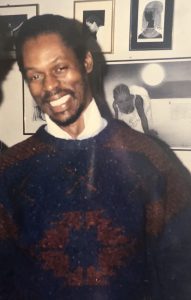
Ronald “Ronn” Tyrone Walker
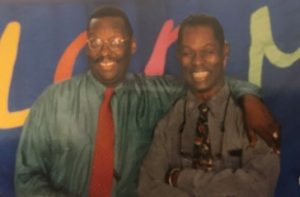
Caption: Ernie McClintock and long-term partner and artist, set designer, Ronn Walker. They lived and worked together for 38 years.
Ernie attended acting classes on a scholarship at the Gossett Academy of Dramatic Arts in Manhattan, New York, in 1965-1966. Oscar award winner and founder of the academy, Lou Gossett, Jr. was impressed by McClintock’s intuition and asked him to teach acting classes alongside him and acting legend James Earl Jones. After six months of teaching at Gossett’s academy which was attended by white and Black students, McClintock wanted to create a Black theatre school centered on Black self-expression, storytelling, and community healing. McClintock, Walker and their friend, historian and artist Marcus Primus, opened the Afro-American Studio for Acting and Speech in Harlem on March 28, 1966.
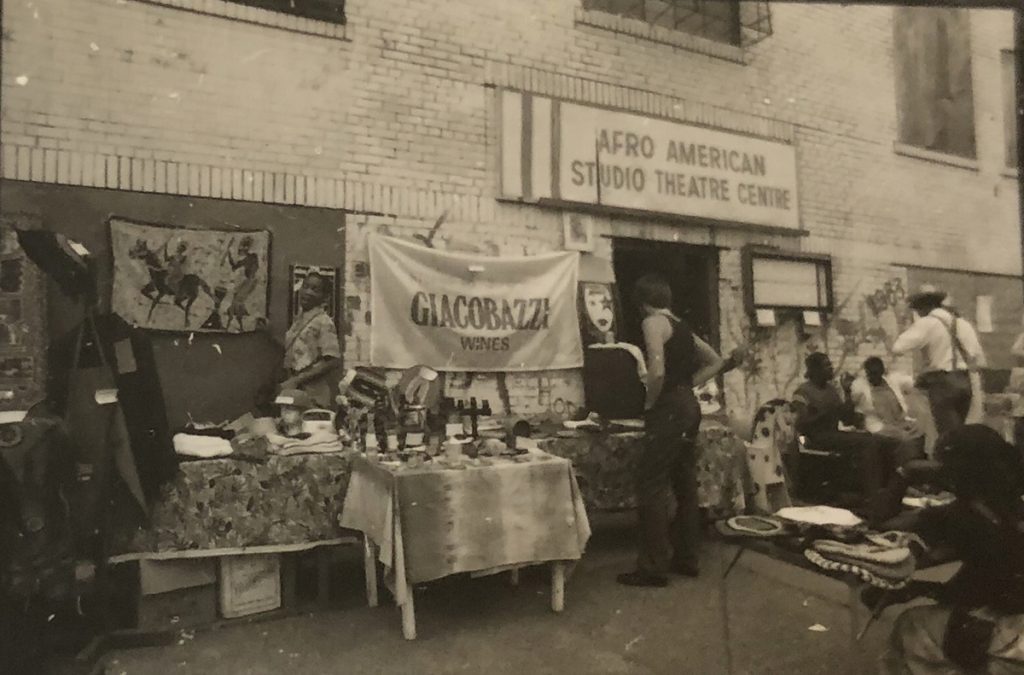
Afro-American Studio for Acting and Speech, Harlem, New York
The school was unique in that it was inclusive of gay people, Black women, and Afro-Caribbeans at a time when they were not getting cast in roles in other theatres. In her book, Ernie McClintock and the Jazz Actors Family, Elizabeth Cizmar writes, “McClintock stood as an outlier in the movement”—he was left out of the mainstream of the Black Arts Movement “because he insisted on including a multitude of voices in his theatres.” The movement discriminated against gay people and Black women, particularly dark-skinned women. In addition, McClintock directed plays that made powerful statements about social justice and depicted struggles of African American people. His productions included Dream on Monkey Mountain (Afro-Caribbean people), Equus (masculine gay men), Spell #7 (Black women), A Raisin in the Sun, El Hajj Malik, Lord Do Remember Me, Rainbow on a Moon Shawl, and The River Niger. McClintock’s work was recognized for excellence in Black theater and created more visibility and inclusion for marginalized groups.
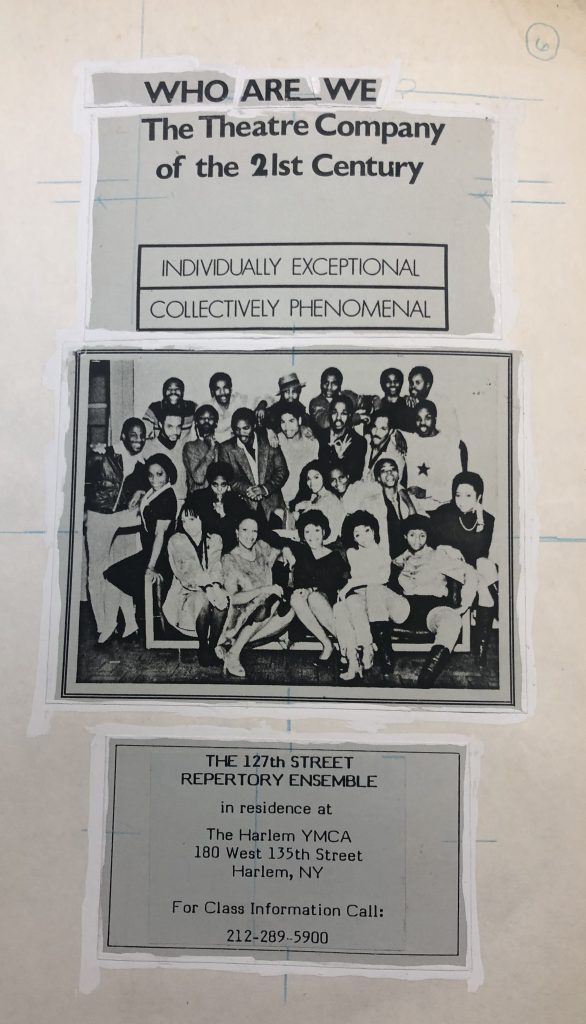
Actors in the Afro-American Studio (1966-1972), the 127th Street Repertory Ensemble (1973-1986), and the Jazz Theatre of Harlem (1986)
While in New York, Ernie crossed paths with many famous actors, directors, and playwrights, who had enormous respect for his work. He worked with Tupac Shakur, Ossie Davis, James Earl Jones, Phylicia Rashad, Morgan Freeman, Lou Gossett, Jr., Sammy Davis, Jr., Marcus Primus, Woody King, Jr., Ntozake Shange, Amiri Bakara, and many more. Tupac Shakur enrolled in the Afro-American Studio in 1983.
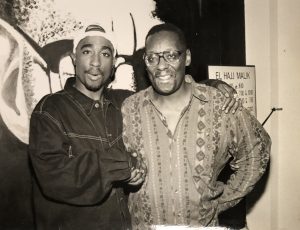
Tupac Shakur and McClintock; Tupac enrolled in the Afro-American Studio in 1983 at the age of twelve.
Tupac was the understudy for Travis Younger in A Raisin in the Sun in 1984 and successfully took over the part when the actor could not continue. Throughout Tupac’s successful career, he kept in touch with Ernie McClintock. Many of the lyrics in his songs focused on healing for the community. Co-actors Hazel Smith, Lee Levy Simon and McClintock were close to him, and the play based on Tupac’s poem, The Rose That Grew Out of Concrete was a homage to Shakur.
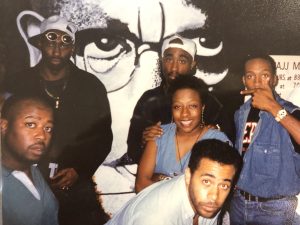
Tupac Shakur in the cast of El Hajj Malik. He was mentored by McClintock.
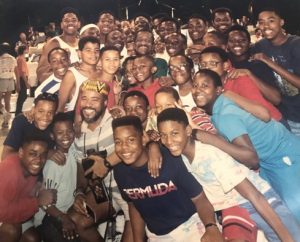
Sammy Davis, Jr. (towards back in the center) worked with the Boys Choir of Harlem. McClintock (not pictured) was the stage director.

James “Jimmy” Walker, from the 1970’s television show, “Good Times.”
Richmond:
In 1986 Ernie McClintock and his partner Ronn Walker, along with other theatre directors in New York, felt the financial strains of the 1980’s and closed their theatres. In addition, fifty-seven of McClintock’s’ friends and company members were dying from illnesses related to HIV and AIDS. McClintock and Walker decided to leave New York and, after searching several cities, they settled in Richmond, Virginia. In 1991 McClintock created the Jazz Actors Theatre, where he focused on training young actors.
McClintock also worked for the City of Richmond’s Parks and Recreation to create Black productions at the Dogwood Dell. There were many African Americans living in Richmond, but the city itself was conservative and did not have many Black theatre productions (Cizmar). McClintock was tenacious and fought for three or four productions per year. He also brought the National Black Theatre to Richmond.
Performances included Before It Hits Home, From the Mississippi Delta, Miss Ever’s Boys, and Ndangered. He also directed new plays written by young playwrights and actors like Derome Scott Smith (R.I.O.T), and Jerome Hairston.
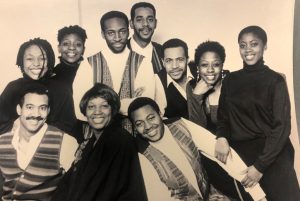
Jazz Actors Theatre: Top row: Mia Burdie, Cheryl Sullivan, dl Hopkins, Linwood Jones, Ed Broaddus, Jakotora Tjoutuku, Mary Hodges. Bottom row: J. Ron Fleming, Toni McDade-Williams, and Derome Scott Smith. Richmond, Virginia.
Awards:
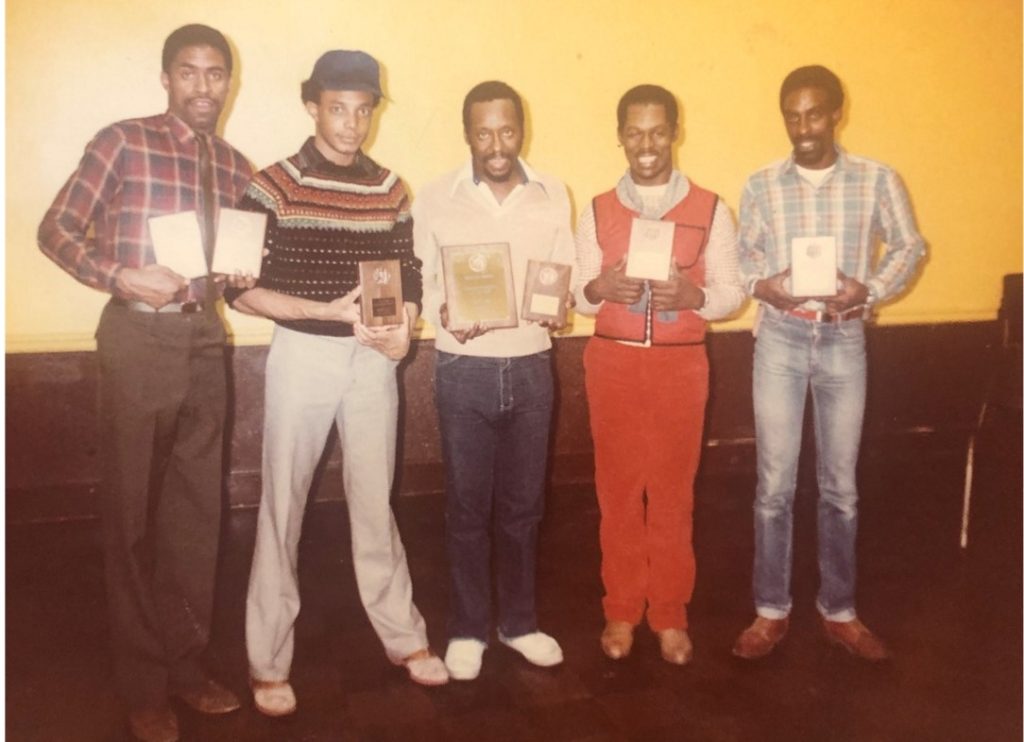
Ernie McClintock’s production of Equus won six AUDELCO Awards in 1982. From left to right: Jerome Preston Bates won for best supporting actor, Greg Wallace won for lead actor, McClintock won Dramatic Production of the Year, and Ronn Walker and Geno Brantley won for their lighting design.
Teaching:
McClintock developed his own “Jazz Style Acting Technique,” or “The Commonsense Approach to Acting.” He believed that for actors to play a part, they must know their authentic self and bring that into their acting using their personal life experiences and imagination of the character. Much like a jazz ensemble, the individual characters play a role with improvisations and create a story together. He saw theatre as a temple of healing, particularly for African Americans who were mistreated throughout American history. He created lesson plans and voice exercises that required the actors to understand their identity as a person and an actor.
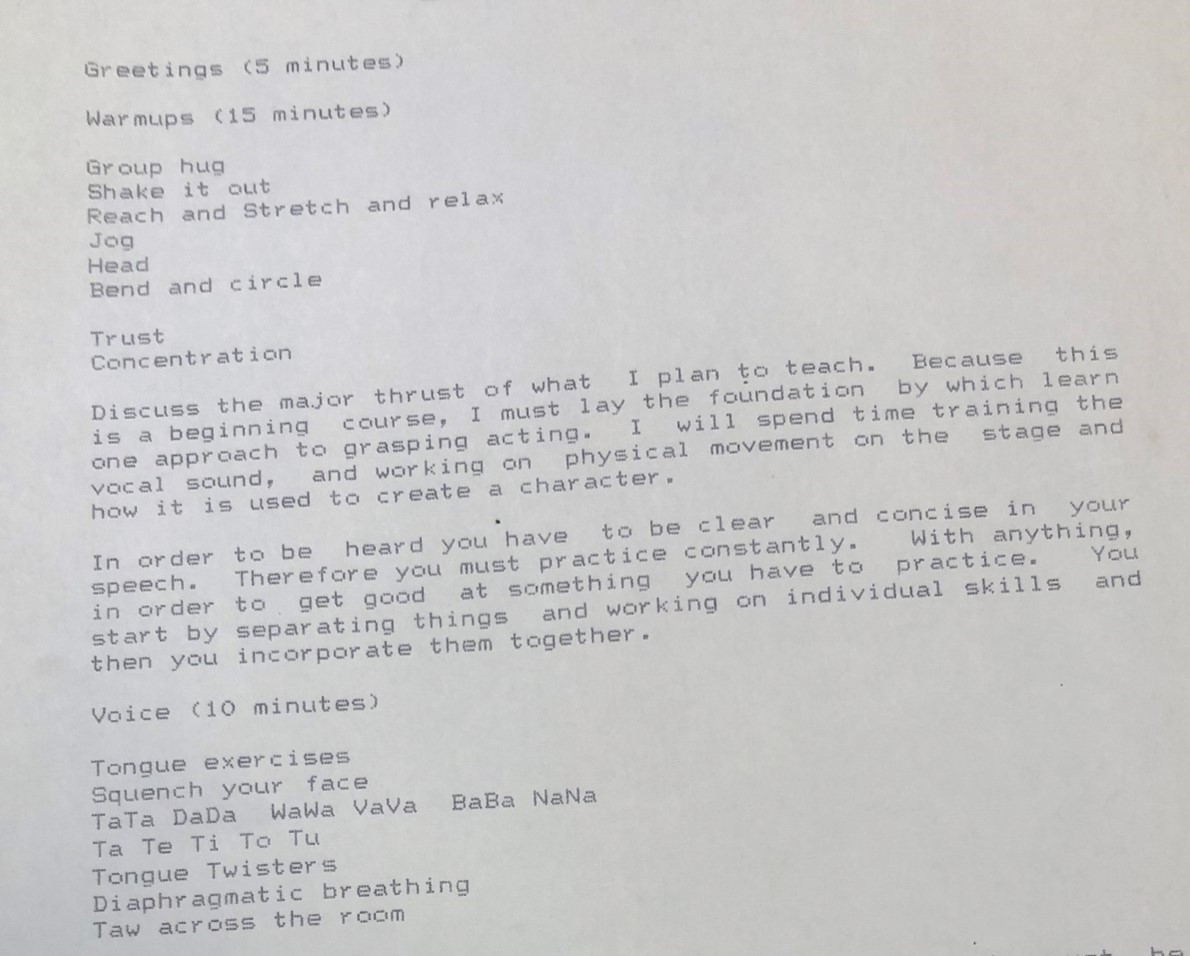
Bolanyle Edwards who portrayed Maxine in Spell #7 said that McClintock’s voice exercises “helped actors get in touch with who they are.” (Cizmar)

Ernie McClintock with actors from the Jazz Actors Theatre, Richmond, Virginia. Ernie McClintock is in the back row, top left.
The McClintock papers contain personal notebooks, scripts, theatre programs, reviews, working files from performances, photographs, and audiocassettes from interviews and productions.
The journals reveal Ernie’s driving passion to create a first-rate theatre and his commitment to teaching African American actors. They contain passionate peptalks that he wrote to inspire himself to keep working toward his goals and daily to-do lists to keep him on track. He also wrote about his loneliness, and his ongoing struggles to find financial support for his life-long dream of sharing Black Theatre as an integral part of society’s culture.
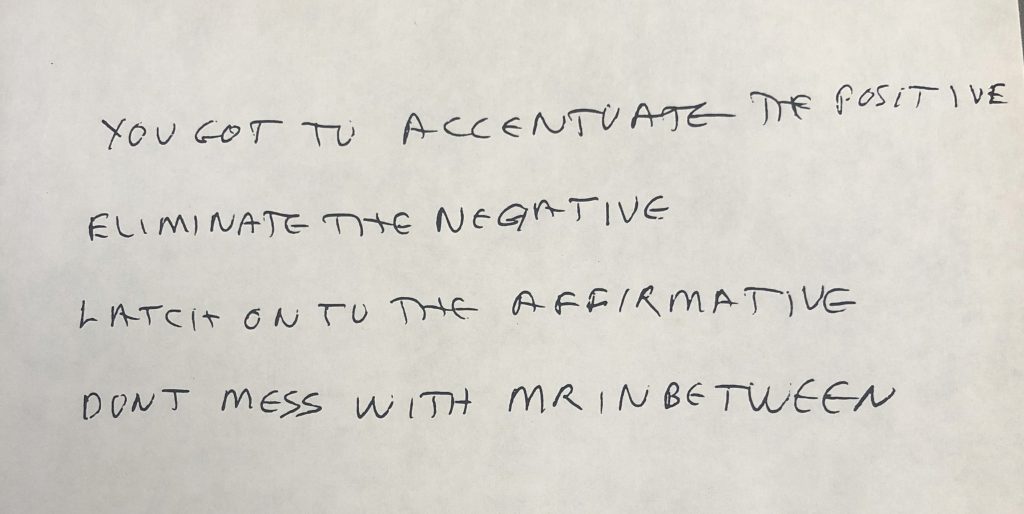
Ernie McClintock pep talk to himself from his diary.
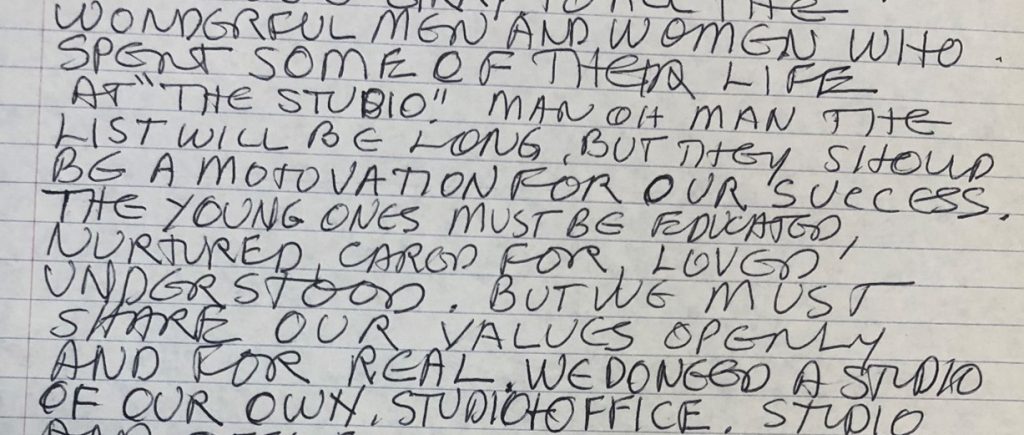
A page from Ernie McClintock’s diary about teaching young actors.
One can still hear Ernie McClintock’s voice on the audiocassette tapes from interviews and performances and follow the lesson plans from the Afro-American Studio for Acting and Speech. Current actors and researchers can benefit from this great teacher and theatre artist who cared as much about the actors as he did about the quality of the performance—and the healing for marginalized communities. His legacy lives on in this collection.
Sources:
Cizmar, Elizabeth M. Ernie McClintock, and the Jazz Actors Family: Reviving the Legacy. New York. Routledge. 2023.
Brantley, Geno. Conversations during his visit to Small Special Collections. October 26, 2023.
Ernie McClintock papers, MSS 16810. Small Special Collections Library, University of Virginia Library.


Thank you for posting this. I so very much enjoyed reading it.
Ernie was part of my mother’s family. He was raised by my grandmother so we always considered him our uncle. I was thinking of him since his birthday is February 19.